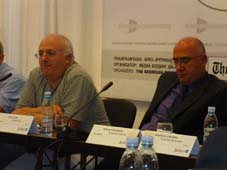Georgian-Russian relations discussed in Tbilisi
By Temuri Kiguradze
Friday, September 4

Three Russian journalists had been invited to the event as special guests, however two of them - Vladimir Mamontov, Editor-in-Chief of Russian daily Izvestia and Maxim Shevchenko, host of a talk show on Russia’s Channel One, were forced to leave Tbilisi just after arriving at the city’s airport. They were accused of violating the Georgian law on occupied territories in the connection with visits to the Georgian breakaway regions Abkhazia and South Ossetia. The incident produced a sharp reaction in the Russian media; the two journalists themselves accused Georgia’s authorities of “fear of open dialogue.” Alan Kasaev, an Editor at the RIA-Novosti Russian news agency, was the only Russian journalist allowed to enter Georgia and participate in the round table.
“I want to state that the accusations against the Russian journalists are absurd. They had no Abkhazian or South Ossetian stamps in their passports, because Maxim Shevchenko had just got a new passport before his arrival in Tbilisi and Mamontov has never in his life been to those regions,” stated Gulashvili before the conference opened. He also noted that “it seems that someone in the Government is not comfortable with the fact that Russian and Georgian society conduct a direct dialogue. In any case I want to thank our authorities, because this incident has given quite a good publicity for our meetings within the framework of this round table,” concluded Gulashvili.
Speaking at the opening Alan Kasaev stated that direct dialogue is vital for improving relations between Russia and Georgia. He announced that Shevchenko and Mamontov had asked him to propose Georgian media and public figures who could actively cooperate in the process of exchanging information. “Vladimir Mamontov says that the Izvestia newspaper is ready to provide Georgian journalists with space for articles concerning Russian-Georgian relations, and the same proposal is possible concerning RIA-Novosti production,” stated Kasaev, adding that the articles of Georgian journalists would be published regardless of the character of the material, even if they are highly critical of the Russian authorities. He also stated that Georgian journalists will be given the chance to conduct a “press tour” to Moscow, where they would have access to Russian politicians and other public figures and hear the point of view of the Russian side on the current events.
Tengiz Pachkoria, a representative of the Russian-Georgian Public Commission, appealed to the Russian authorities to change their policy towards Georgia and propose something beneficial for the country instead of threatening it with force as is happening now. “At this stage Georgia has nothing to propose to Russia and Russia as the bigger country should make a proposal to Georgia itself,” concluded Pachkoria.
Another Georgian journalist, Shalva Ramishvili, who was head of Georgian TV company 202 before being jailed for alleged corruption and considers himself a freed political prisoner, said that Russia had failed to conduct a reasonable policy in Georgia. “While American and other Western forces provided Georgia with billion dollar aid and other support in different spheres, including the education of thousands of Georgian students in universities abroad, Russia failed to propose something interesting for Georgia. Now it’s natural that the young Georgian generation has forgotten the Russian language and culture and is in favour of the country adopting a Western orientation. Russia hasn’t tried to keep its cultural and economic ties and hasn’t used its abilities to make itself more attractive to Georgians like the USA has. In fact it has often sought to damage Georgia’s interests, this process reaching its peak when Russia recognised Abkhazia and South Ossetia. After that for me personally there is no question as to which orientation is more beneficial for Georgia,” stated Ramishvili, who concluded by saying, “Russian Army – go home!”
Georgian opposition MP Petre Mamradze accused the current Georgian authorities of an inability to maintain normal relations with Russia. “Saakashvili conducted an adventure [in South Ossetia]. I think Georgia was able to avoid the events of August 2008 and the acting President [Saakashvili] and his team are to blame for not doing so,” stated Mamradze.
”Why should Georgia and Georgians have a sclerosis? The relations of Georgia and Russia were not spoiled in August 2008 but back in the 90s, when Russia supported the separatists with weapon, soldiers and officers. Russia’s argument is fear, but fear is not a right argument for the improvement of relations. When we say we want Russian-Georgian relations to be better, we should define on what this improvement will be based,” stated Lasha Tughushi, Editor-in-Chief of the Rezonansi Georgian daily.
No Georgian Government member attended the round table discussion, though two opposition politicians attended. The participants and organisers noted that these kinds of meetings are part of “civil diplomacy” and will continue to be conducted. “We shouldn’t kid ourselves and state that the improvement of relations between the Governments of Russia and Georgia will happen soon. For now these kind of round tables involving representatives of Georgian and Russian society are the only chance of maintaining relations,” Alan Kasaev stated at the meeting.
